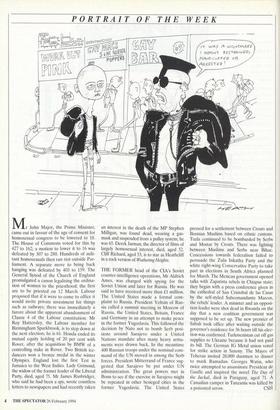PORTRAIT OF THE WEEK
Mr John Major, the Prime Minister, came out in favour of the age of consent for homosexual congress to be lowered to 18. The House of Commons voted for this by 427 to 162; a motion to lower it to 16 was defeated by 307 to 280. Hundreds of mili- tant homosexuals then ran riot outside Par- liament. A separate move to bring back hanging was defeated by 403 to 159. The General Synod of the Church of England promulgated a canon legalising the ordina- tion of women to the priesthood; the first are to be priested on 12 March. Labour proposed that if it were to come to office it would invite private investment for things such as railways; there was immediately a furore about the apparent abandonment of Clause 4 of the Labour constitution. Mr Roy Hattersley, the Labour member for Birmingham Sparkbrook, is to step down at the next election; he is 61. Honda ended its mutual equity holding of 20 per cent with Rover, after the acquisition by BMW of a controlling stake in Rover. Two British ice- dancers won a bronze medal in the winter Olympics. England lost the first Test in Jamaica to the West Indies. Lady Grimond, the widow of the former leader of the Liberal Party, died, aged 75. Mr James Rusbridger, who said he had been a spy, wrote countless letters to newspapers and had recently taken
an interest in the death of the MP Stephen Milligan, was found dead, wearing a gas- mask and suspended from a pulley system; he was 65. Derek Jarman, the director of films of largely homosexual interest, died, aged 52. Cliff Richard, aged 53, is to star as Heathcliff in a rock version of Wuthering Heights.
THE FORMER head of the CIA's Soviet counter-intelligence operations, Mr Aldrich Ames, was charged with spying for the Soviet Union and later for Russia. He was said to have received more than £1 million. The United States made a formal com- plaint to Russia. President Yeltsin of Rus- sia called a summit meeting in Moscow of Russia, the United States, Britain, France and Germany in an attempt to make peace in the former Yugoslavia. This followed the decision by Nato not to bomb Serb posi- tions around Sarajevo under a United Nations mandate after many heavy arma- ments were drawn back. In the meantime 400 Russian troops under the nominal com- mand of the UN moved in among the Serb forces. President Mitterrand of France sug- gested that Sarajevo be put under UN administration. The great powers met in Bonn to see if the exercise in Sarajevo might be repeated in other besieged cities in the former Yugoslavia. The United States pressed for a settlement between Croats and Bosnian Muslims based on ethnic cantons. Tuzla continued to be bombarded by Serbs and Mostar by Croats. There was fighting between Muslims and Serbs near Bihac. Concessions towards federalism failed to persuade the Zulu Inkatha Party and the white right-wing Conservative Party to take part in elections in South Africa planned for March. The Mexican government opened talks with Zapatista rebels in Chiapas state; they began with a press conference given in the cathedral of San Cristobal de las Casas by the self-styled Subcomandante Marcos, the rebels' leader. A minister and an opposi- tion leader were shot dead in Rwanda on the day that a new coalition government was supposed to be set up. The new premier of Sabah took office after waiting outside the governor's residence for 36 hours till his elec- tion was confirmed. Turkmenistan cut off gas supplies to Ukraine because it had not paid its bill. The German IG Metal union voted for strike action in Saxony. The Mayer of Teheran invited 20,000 dustmen to dinner to mark Ramadan. Georges Watin, who twice attempted to assassinate President de Gaulle and inspired the novel The Day of the Jackal, died in Paraguay, aged 71. A Canadian camper in Tanzania was killed by


























































 Previous page
Previous page